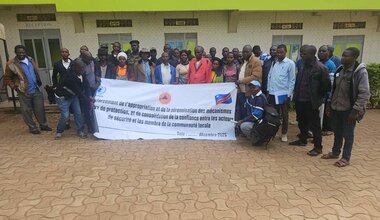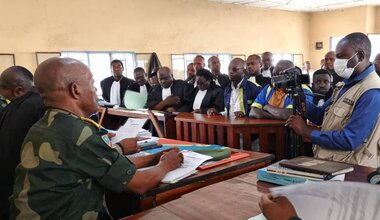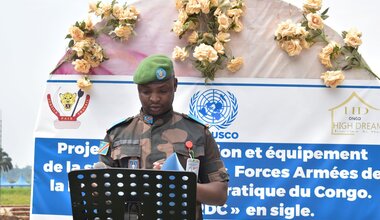“I helped 400 families break free from the armed groups''
The disarmament and demobilization of Congolese and foreign combatants in the Democratic Republic of the Congo is a key issue in building peace and stability in the country and, more broadly, in the Great Lakes region.
Mohamed El Akremi Abdouli, a Tunisian, works as Operations Assistant in the Disarmament, Demobilization, and Reintegration/ Repatriation and Resettlement (DDR/RR) section of the United Nations Organization Stabilization Mission in the Democratic Republic of the Congo. "In practice, the DDR/RR programme consists of two distinct but complementary components. On the one hand, disarmament, demobilization, and reintegration (DDR) of Congolese combatants and, on the other hand, disarmament, demobilization, repatriation, resettlement, and reintegration (DDRRR) of foreign combatants in their respective countries, with the objective being their return to civilian life," Abdouli explains.
During a two and a half year assignment in Kanyabayonga, 150 km north of Goma, Abdouli supervised the DDR/RR transit site in Kanyabayonga, as well as sites in Luofo, Nyanzale, and Rwindi, 30 km north-west, 70 km south, and 25 km east of Kanyabayonga, respectively.
As part of his duties, Abdouli also participated in awareness raising operations and regularly went into areas controlled by armed groups. "We use various techniques to raise awareness: video projections in the villages, periodic radio broadcasts, leaflet distribution manually or by helicopter airdrop in inaccessible areas, and face-to-face interactions, including direct meetings with leaders of armed groups and combatants. The objective of these techniques is to reach the greatest number of combatants and to persuade them to surrender and return to civilian life," he remarks.
Redeployed to Goma in January 2014, Abdouli is now responsible for overseeing logistics at the Munigi transit camp and two other DDR sites, and for receiving ex-combatants: "When a combatant arrives, we collect his weapon if he has one, then proceed to the demobilization step for Congolese soldiers, or repatriation step for foreign soldiers. During this step, we record personal data (profiling), information about the armed groups (screening), and provide a medical exam if necessary. The ex-combatant then receives a civilian package including clothing, a hygiene kit, etc. Ex-combatants remain in the transit camp for several days before being repatriated to their country or sent to a DDR camp in Kisangani," explains Abdouli.
A former soldier, Abdouli worked in the DDR/RR section as a Military Observer from 2007 to 2008. He returned in 2011 as a United Nations Volunteer. He explains: "It’s exciting work. What I like best is the adventure and the humanitarian aspect of the work. Adventure because it’s dangerous work involving risks, especially during face-to-face operations or while extracting combatants from the armed groups. Humanitarian because we’re helping the combatants (whether recruited by force or not), and their families break free from the armed groups and return to a normal life. So far, I can say that I helped 400 families break free from the armed groups. By encouraging combatants to surrender, we are also helping the civilian populations regain peace and stability."
 UN
UN United Nations Peacekeeping
United Nations Peacekeeping





